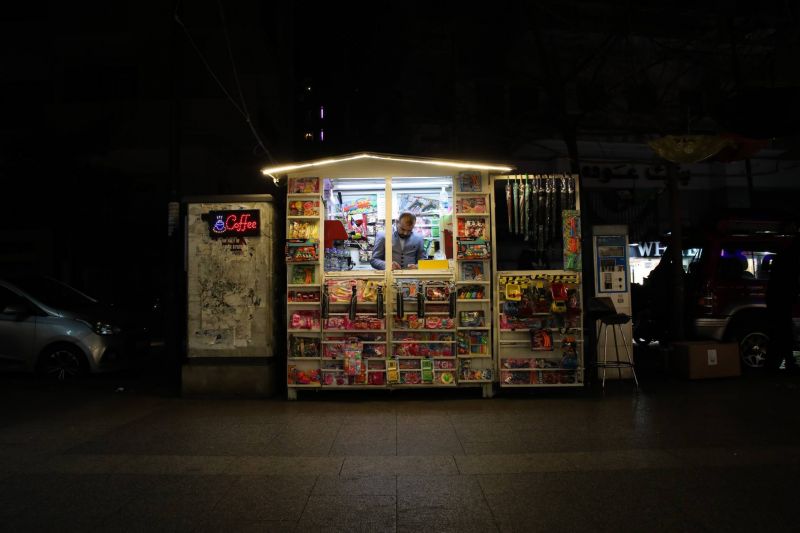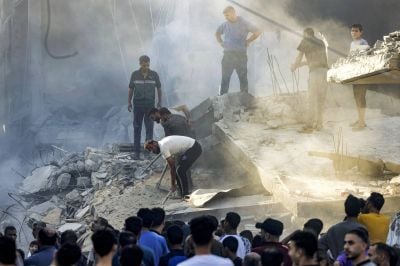
A merchant on Hamra Street, Beirut. (Credit:Florient Zwein/Hans Lucas Archives)
Follow our live coverage here.
"Extending the conflict to Lebanon would have catastrophic consequences," said the Lebanese Business Leaders Association (RDCL) last Friday in response to the escalating tension at the southern border due to the fighting between Hamas and Israel.
Among the devastating consequences a conflict could have on the Lebanese economy, they cited the worsening of the country's monetary and financial situation, the erosion of international money transfers, the impact on already failing infrastructure, and "fatal consequences for the supply chain."
While the opening of a "second Lebanese front" is not yet a given, the mere prospect of an imminent war already seems to affect the national economy.
"There is clearly a 'before' and an 'after' Oct. 7," said Nicolas Chammas, Secretary-General of the Lebanese Economic Organizations and President of the Beirut Traders Association (ACB).
He added that "the country's economic activity suddenly took a nosedive," and "the consumption cycle instantly stalled."
This doesn’t come as a surprise to Simon Neaimé, a professor of economics at the American University of Beirut (AUB). He explained to L’Orient-Le Jour that “in times like these, investments in the economy suffer first because they are merely a reflection of economic agents' projections and expectations. The inability to clearly anticipate the evolution of events typically results in a direct interruption of investments."
Still, he said, “considering that the Lebanese economy has been in crisis for more than four years and is already operating at a very slow pace, investments in it are not very significant. They represent a small portion compared to the revenues generated by the tourism sector, which will bear the brunt of the losses in the short term."
The first victim: Tourism
While this summer witnessed a boom in tourism in Lebanon, and the winter holiday season was already in the works, Lebanese merchants, restaurateurs and other economic players are now worried about the future.
Tony Ramy, the President of the Syndicate of Restaurant, Nightclub and Café Owners in Lebanon said "September was better than what professionals expected, and the results of the first week of October gave hope for the same."
According to him, this improvement in tourism activity resulted from the arrival of a significant number of European tourists and the resumption of conferences in major hotels.
However, since the outbreak of the war in Gaza, the situation has changed. Ramy noted, "Since the beginning of the conflict, restaurant activity has decreased by 70 percent to 80 percent during the week and 30 percent to 50 percent on weekends compared to the first week of the month."
Jean Abboud, President of the Association of Travel and Tourism Agencies in Lebanon, confirmed a similar impact: "Many tourists are leaving Lebanon prematurely, and others who haven't arrived yet are canceling their trips." He also mentioned that the number of passengers arriving at Beirut International Airport has decreased by about 30 percent year-on-year for the period between the 10th and the 15th of this month.
Tony Ramy also noted that his syndicate expected the opening of about 30 restaurants by the end of November.
"Part of this is now on hold,” he explained. “Work and investments are on hold until we get a clearer picture."
Nagi Morkos, co-manager of the tourism and hospitality consultancy firm Hodema, agreed that there has been a decline in attendance at dining and leisure venues.
But he said he believes that investments and long-term projections in the tourism and hospitality sector continue as if nothing has happened. "These projects are designed for the long term, and the decision to stop such investments is not made overnight," he explained.
This is primarily due to "the fact that Lebanese entrepreneurs are accustomed to crises and know that there is a rebound after each crisis. Also, Lebanon's economy has become a cash economy (due to the financial crisis), and people have cash that they want to invest."
According to him, Lebanese and dual nationals are still searching for land in Lebanon to build their projects this week, despite the circumstances.
Nevertheless, pessimism prevails among travel agencies regarding the turn their business may take in the coming months. In addition to the immediate impact of this climate on their business, they are also witnessing longer-term consequences: "Many groups of tourists who had previously booked for the year-end period are already starting to cancel their flights or seriously consider it," said Jean Abboud.
‘Order postponements’
The same goes for merchants: "I used to start preparing for the holiday season, which represents 60 percent of my turnover, from October," said Mona Salameh, manager and founder of the Hoda and Chocolat workshop.
"But given the situation…we are...only placing orders for the upcoming week. We cannot afford to stock up today for a longer period due to the current uncertainty. This puts us at risk of running out of stock from our suppliers and missing the holiday season."
For her beauty and hygiene products company, Salma, Rosemary Romanos explained that she wanted to build up a large stock of raw materials to plan her production for an entire year. "But given the current situation, I intend to keep this amount in cash to potentially address other unexpected events."
According to Nicolas Chammas, merchants, like restaurateurs, are also in a difficult situation today:
"Since Oct. 7, we observed an average drop in activity ranging from 50 percent to 75 percent compared to the same period last year, and this has worsened this week."
It is a bad omen, given that "businesses usually have until mid-November to prepare for the holiday season, depending on their activity," said the president of the ACB.
"If no visibility emerges by then, the consequences could be disastrous for them," he warned.
As in any war, even a potential one, some niches seem to fare a bit better, such as supermarkets and furniture.
"On the one hand, the population is starting to stock up, or even 'overstock,' some basic necessities in anticipation of the worst. On the other hand, some families are fleeing from risky areas to safer ones, sometimes renting minimally furnished homes," observed Nicolas Chammas.
In the first three days of the conflict, the supermarket sector witnessed a 25 percent increase of turnover in stores located in southern Beirut and 10 percent to 15 percent in those in the north of the capital, according to Nabil Fahed, the President of the Syndicate of Supermarket Owners.
These results are mainly related to a rush on canned goods, legumes, rice and vegetable oils, he added.
This article was originally published in French in L'Orient-Le Jour.


